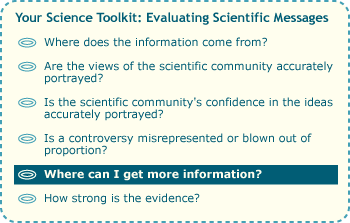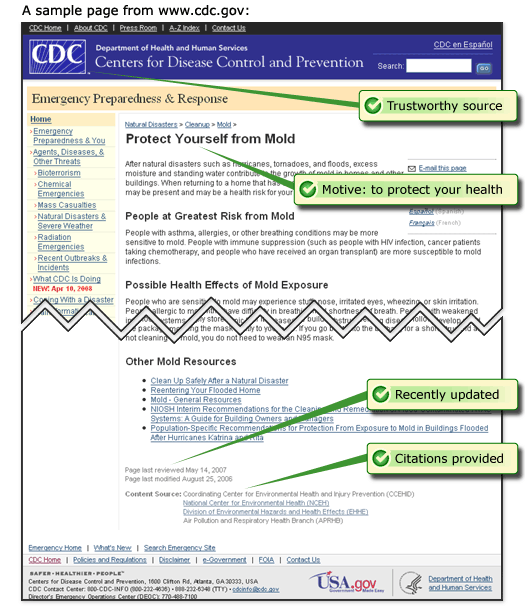
Sometimes an article in your local newspaper just isn't enough. Maybe you've opened your morning paper to a report on herbal treatments for cold symptoms. With your stuffy nose and scratchy throat, the idea sounds appealing — but you need more information about side effects, drug interactions, and the supporting evidence. Or perhaps you've heard about policy changes that would encourage people to buy cars that can run on ethanol instead of regular gasoline, but before you jump on the bandwagon you want to know the scientific basis for this switch. A popular science article or an article in your local paper may not give you enough information to make a judgment and may even selectively discuss evidence, ignoring some lines entirely — but with a little extra research, you can do better than your local paper. Where should you go to learn more about the science underlying these issues? For topics of current research, the books available at your library may be out of date and many details are likely squirreled away in journal articles that could be difficult to access and interpret. In this situation, the internet is a great resource, but not all internet sites are created equal and not all of them offer unbiased explanations of the science at stake.
Here are a few considerations for finding additional sources of scientific information online:
- Find sources with scientific expertise.Try to find websites produced by a research institute, a governmental body, a respected educational institution, or a major scientific association (e.g., the American Psychological Association). These sorts of organizations are all key parts of the scientific community and have an interest in accurately explaining scientific issues. For example, the Centers for Disease Control, the American Association for the Advancement of Science, the U.S. Geological Survey, the U.S. Fish and Wildlife Service, or Nature magazine are all trustworthy choices. On the other hand, Badger Creek Elementary and Tipsfromtodd.com probably don't have access to up-to-date scientific information and may not feel any responsibility to provide fair and accurate information.
- Avoid ulterior motives.— scientists disagreeing about a less central aspect of a scientific idea. For example, evolutionary biologists have different views on the importance of punctuated equilibrium (a pattern of evolutionary change, characterized by rapid evolution interrupted by many years of constancy). This controversy focuses on an important aspect of the mode and rate of evolutionary change, but a change in scientists' acceptance of punctuated equilibrium would not shake evolutionary biology to its core. Scientists on both sides of the punctuated equilibrium issue accept the same basic tenets of evolutionary theory.
- Keep it current.Science is ongoing and is continually updating and expanding our knowledge of the universe. Scientists publish many hundreds of papers each year on areas of active scientific research. For example, in 2006 alone, more than 15,000 scientific articles on the topic of breast cancer were published. Because of the rapid pace at which our scientific knowledge advances, websites can easily become out-of-date if not actively maintained. So a website last updated in 2002 is unlikely to give you a useful understanding of the costs and benefits of using ethanol as fuel. Instead, look for a more current website.
- Check for citations.As described in Scientific culture, scientific publications generally give credit to related research by providing a list of citations — and that means that citations can help you gauge a website's scientific validity. A website that provides a comprehensive list of citations from scientific journal articles is more likely to provide an accurate portrayal of the science involved than one with suspicious, scanty, or nonexistent references. As an added bonus, by studying those references, you can double-check the website's information or dig even deeper into the issue.



TAs an example of how one might get more information on a science-related issue, let's return to our sample article on global warming, which briefly describes scientist Lonnie Thompson's ice core studies. Where could one find more details on ice cores and how they can inform global warming research? First, you might check out an interview with the scientist from National Geographic. This 2004 article is written for the general public (and includes no citations) but is from a trustworthy source and offers the direct perspective of a scientist involved with the work. And if that's not enough, you might turn to NASA's in-depth tutorial on paleoclimatology, which meets all of our guidelines: it's from a trustworthy source without ulterior motives (NASA), was posted relatively recently (2005), and includes citations from the scientific literature.